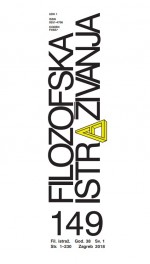Pojam savjesti od Grka do Nietzschea
The Notion of Conscience from Ancient Greece to Nietzsche
Author(s): Vladimir JelkićSubject(s): Christian Theology and Religion, German Idealism, Philosophy of Religion, Ontology
Published by: Hrvatsko Filozofsko Društvo
Keywords: conscience; Christianity; modernity; subjectivity; Socrates; Friedrich Nietzsche; Joseph Ratzinger; Georg Wilhelm Friedrich Hegel; St. Paul; ethics;
Summary/Abstract: This paper discusses the notion of conscience from a very broad historical perspective, but the author tries to clarify it by taking into consideration the points of view of only those thinkers that he considers crucial for understanding the meaning of the notion of conscience, and the way it has changed from Socrates to Nietzsche. The analysis begins with St. Paul’s hypotheses as interpreted by Joseph Ratzinger. After that, the author refers to Socrates’ notion of daimonion. The thesis moves on to discuss Hegel’s understanding of conscience, where conscience is emphasized as a component of modernity, but at the same time Hegel is also pointing at the very limit of conscience: that the essence of conscience lies in its subjectivity and this is where, according to Hegel, there is a possibility of conscience to transform into evil. Therefore, Hegel holds that the victory of Socrates perspective resulted in the reign of the particularity of purposes and interests in Athens. It is what has brought about the decline of Athens! Therefore, subjectivity should be within what Hegel calls “ethical life” (Sittlichkeit). Nietzsche observes the problem in a very different way: he relates conscience to the memory of “the godlike structure of our being”. Regardless of Nietzsche’s criticism of Socrates, the author concludes that, with both of them, the notion of conscience corresponds to the understanding of power and responsibility to self.
Journal: Filozofska istraživanja
- Issue Year: 38/2018
- Issue No: 01/149
- Page Range: 195-203
- Page Count: 9
- Language: Croatian

